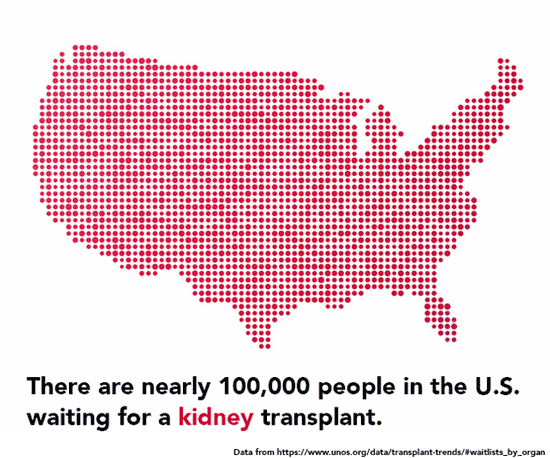Misleading Biopsies May Cause Viable, Donated Kidneys to Be Discarded
Jul 10, 2017

Based on biopsy results, thousands of donated kidneys each year are discarded instead of being transplanted, but a new study from physicians at Columbia University Medical Center and NewYork-Presbyterian suggests that biopsies underestimate organ quality.
“It’s a complex issue, but our findings suggest that biopsy results should be used not to discard organs, but instead used in limited circumstances to guide recipient selection,” says the study’s lead investigator Sumit Mohan, MD, nephrologist at NewYork-Presbyterian and associate professor of medicine and epidemiology at Columbia University Medical Center.
Each year, nearly 20 percent of deceased-donor kidneys recovered with the intent to transplant are instead discarded. The most common reason cited for rejecting a kidney is a poor biopsy result. Biopsies allow physicians to look for any abnormalities in the microanatomy of the organ, Dr. Mohan says, but it’s unclear how well biopsy results predict the long-term health of a transplanted kidney.
The new study looked at nearly 1,000 kidney biopsies that were processed by pathologists at NewYork-Presbyterian/Columbia University Medical Center from 2005 through 2009 and the subsequent long-term function of the organ in the recipients.
For living-donor transplantation, biopsy results did not help predict long-term outcomes.
For deceased-donor kidneys, long-term outcomes did correlate with biopsy findings, but the researchers also found that 73 percent of deceased-donor kidneys with even suboptimal biopsy results were still functioning five years later.
Transplantation with even suboptimal kidneys provides a significant survival advantage compared to remaining on dialysis, Dr. Mohan says.
“Once the clinical characteristics of a donor are known, the histology found on biopsy does not improve the assessment of the quality of the kidney or predict how well it’s going to function in the long term,” Dr. Mohan adds. “Our study raises serious questions about transplant centers using biopsy findings to make decisions about whether to use an available kidney for their patients.”
###
The authors report no conflicts of interest.
The study, “Impact of Reperfusion Renal Allograft Biopsy Findings on Renal Transplantation Outcomes,” was published in the Journal of the American Society of Nephrology on July 6, 2017.
The research was supported by the Laura and John Arnold Foundation, American Society of Transplant Surgeons, the Transplantation and Immunology Research Network of the American Society of Transplantation, and the NIH (R01 MD010290).
Additional co-authors are Eric Campenot, Mariana Chiles, Dominick Santoriello, Eric Bland, R. John Crew, Paul Rosenstiel, Geoffrey Dube, Ibrahim Batal, Jai Radhakrishnan, P. Rodrigo Sandoval, James Guarrera, Michael Stokes, Vivette D’Agati, David Cohen, Lloyd Ratner, and Glen Markowitz (all CUMC).


